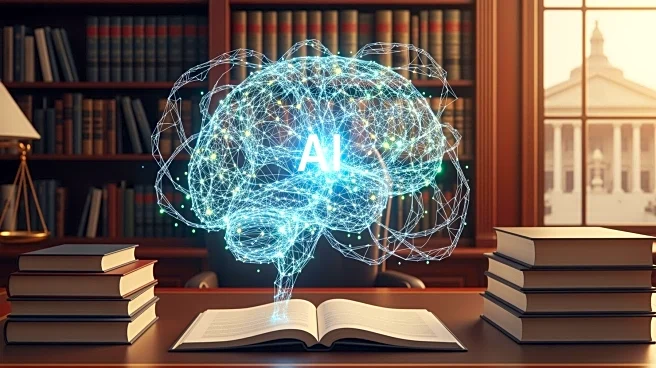What's Happening?
The legal industry is grappling with the integration of artificial intelligence (AI) into its workflows, as highlighted by recent incidents of AI-generated errors in legal filings. The phenomenon, known
as 'AI hallucination,' has led to situations where lawyers have submitted filings with incorrect citations, raising concerns about the reliability of AI tools in legal practice. Despite the potential of AI to streamline processes, the technology has also exposed vulnerabilities in the legal system, where human oversight remains crucial. The debate continues on whether AI is making lawyers less diligent or simply highlighting existing carelessness. The industry is exploring ways to adapt to the changes brought by AI, while maintaining the integrity of legal processes.
Why It's Important?
The integration of AI in the legal industry is significant as it promises to enhance efficiency and reduce the time spent on routine tasks. However, the challenges faced highlight the need for careful implementation and oversight to prevent errors that could have serious legal consequences. The reliance on AI tools without adequate human intervention could undermine the credibility of legal processes and lead to potential legal liabilities. As AI continues to evolve, the legal industry must find a balance between leveraging technology and ensuring accuracy and accountability in legal practice.
What's Next?
The legal industry is likely to continue exploring AI tools while emphasizing the importance of human oversight. Future developments may include improved AI systems with better accuracy and reliability, as well as training programs for legal professionals to effectively use AI tools. The industry may also see increased collaboration between AI developers and legal experts to address the current challenges and enhance the functionality of AI in legal practice.
Beyond the Headlines
The ethical implications of AI in the legal industry are profound, as the technology could potentially alter the nature of legal work and decision-making. The shift towards automation raises questions about the role of human judgment and the potential for AI to influence legal outcomes. As AI becomes more integrated into legal processes, there is a need for ongoing dialogue about the ethical and legal standards that should govern its use.









